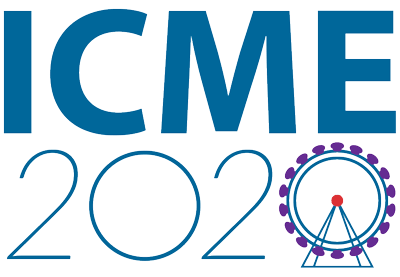Future trends in Artificial Intelligence: research challenges in the next decade and beyond
The popularity of AI technologies over the past decade has grown to an extent that any technological solution that does not involve an AI component is seen as technologically primitive or plainly inefficient. The panel, comprised of researchers who work on various AI applications, will reflect on current research advances in AI and discuss their technological and societal impact. Panel members will then attempt to envision the research challenges that will define and drive future developments in several of the application domains of AI, including healthcare, education, and entertainment.

Kjersti Engan is a full professor at the Electrical Engineering and Computer Science department at the University of Stavanger (UiS), Norway. She received the BE degree in electrical engineering from Bergen University College in 1994 and the M.Sc. and Ph.D degrees in 1996 and 2000 respectively from UiS. She is a co-leader of the Biomedical data analysis lab – BMDLab – at UiS (www.ux.uis.no/bmdlab). Her research interests are in signal and image processing and machine learning with emphasis on medical applications and in dictionary learning for sparse signal and image representation. Past and current projects in collaboration with local and international hospitals and partners include analysis, classification and segmentation in Cardiac MR on infarct patients, brain MRI on dementia patients, CT Perfusion images from stroke patients and on histopathological images for different cancer types. She is also active in projects on cardiac arrest and newborn survival, contributing with analysis and classification on fetal heart rate signals, ECG and ventilation signals and on video analysis for activity detection during resuscitation.
Kjersti is a senior member of IEEE, and a board member of NOBIM (Norwegian Image and Pattern Recognition Society). She has served as Associate editor and Senior Area editor for IEEE Signal Processing Letters. She is currently a member of IEEE Image, Video, and Multidimensional Signal Processing Technical Committee (IVMSP), and an associate editor for SIAM Journal on Imaging Sciences (SIIMS).

Dr. Lina J. Karam is the Dean of the School of Engineering and Professor of Electrical and Computer Engineering at the Lebanese American University. She is an IEEE Fellow and Editor-In-Chief of the IEEE Journal on Selected Topics in Signal Processing (IEEE JSTSP). She is also an Emerita Professor of Electrical and Computer Engineering at Arizona State University. Dr. Karam was awarded a U.S. National Science Foundation CAREER Award, a NASA Technical Innovation Award, IEEE Region 6 Award, IEEE SPS Best Paper Award, Intel Outstanding Researcher Award, and IEEE Phoenix Section Outstanding Faculty Award. Dr. Karam’s industrial experience includes video compression R&D at AT&T Bell Labs, multidimensional data processing and visualization at Schlumberger, and collaborations on computer vision, machine learning, image/video processing, compression, and transmission projects with various industries. She served as General Chair of IEEE ICIP 2016 and as General Co-Chair of IEEE ICME 2019. She helped initiate the World’s First Visual Innovation Award that was presented for the first time at IEEE ICIP 2016 and more recently the World’s First Multimedia Star Innovator Award that was presented at IEEE ICME 2019. Dr. Karam has over 220 technical publications and she is an inventor on 7 issued US patents. She served on the IEEE Publication Services and Products Board (PSPB) Strategic Planning Committee, IEEE SPS Board of Governors, IEEE CAS Fellow Evaluation Committee, and the IEEE SPS Conference Board. In addition to serving as EiC of IEEE JSTSP, Dr. Karam is currently serving on the IEEE TechRxiv Advisory Board, IEEE Access Journal Editorial Board, IEEE SPS Awards and Publications Boards, IEEE SPS IVMSP TC, and IEEE CAS DSP TC.

Tao Mei is a Technical Vice President with JD.COM and the Deputy Managing Director of JD AI Research. His team is focusing on the research, development, innovation and commercialization of computer vision and multimedia technologies, with a broad range of applications in retail, logistics, finance, cloud, and new media. He also led the effort on machine learning platform. Prior to joining JD.COM in 2018, he was a Senior Research Manager with Microsoft Research Asia in Beijing, China, where he has shipped over 20 inventions and technologies to Microsoft products and services.
Tao has authored or co-authored over 200 publications (with 12 best paper awards) in journals and conferences, and holds over 50 US and international patents. He was elected as a Fellow of IEEE, a Fellow of IAPR, a Distinguished Scientist of ACM, and a Distinguished Industry Speaker of IEEE Signal Processing Society, for his contributions to large-scale multimedia analysis and applications.

Alan Smeaton is Professor of Computing at Dublin City University where he has previously been Head of School and Executive Dean of Faculty. His early research interests covered the application of natural language processing to information seeking tasks and this evolved into the analysis and indexing of visual media (image and video) to support user tasks such as video searching, browsing and summarisation. Currently Alan’s research is around technology to support people in information seeking tasks and using this to compliment the frailties of our own human memory. Alan has a particular focus on lifelogging, automatically recording information about yourself, your everyday life and the recording is done by yourself, and for your own personal use. In 2001 Alan was a co-founder of TRECvid, the largest collaborative benchmarking activity in content-based tasks on digital video,and TRECVid has continued annually since then with over 2,000 researchers having contributed overall. Alan is a member of the Royal Irish Academy and an Academy Gold Medallist in Engineering Science, and award given only once every three years as “testament to a lifetime of passionate commitment to the highest standards in scholarship”. He is a Fellow of the IEEE and the current Chair of ACM SIGMM (Special Interest Group in Multimedia).

Nikolaos is an academic with the Department of Electronic and Computer Engineering of Brunel University London. His research is in the areas of image/signal processing, biometrics, and intelligent systems. He has published over 100 peer-reviewed journal and conference articles in his areas of interest.
Nikolaos served as Technical Program Chair for the 2018 edition of the IEEE International Conference on Image Processing (ICIP). He was co-editor of the book Biometrics: Theory, Methods, and Applications. He currently serves as Senior Area Editor for the IEEE Transactions on Image Processing and in the past he held several other editorial and guest editorial roles. He is a senior member of the IEEE and an elected member of the IEEE Multimedia Signal Processing Technical Committee (MMSP – TC).

